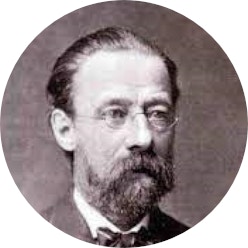
Bedřich Smetana
March 2, 1824 - Litomyšl — May 12, 1884 - Prague
About
Born March 2, 1824, in Litomyšl to the east of Prague, Bedřich Smetana was just four years old when he began learning the violin and piano under the tutelage of his father, a professional brewer who—despite being an avid music lover—did not wish to see his son pursue music as a career... But young Bedřich persisted and completed his studies in 1943, then began teaching music while continuing his studies with pianist Joseph Proksch. He performed as a pianist and conductor for many years but abandoned these careers in 1874 when he completely lost his hearing, dedicating himself entirely to composition. He passed away in Prague on May 12, 1884.
Bedřich Smetana is often considered the father of Czech music, one of the first to incorporate elements of Czech folklore into his music and, most notably, to use the Czech language in his operas instead of the more widely-used German. Indeed, he is credited with composing the very first opera in Czech history, The Brandenburgers in Bohemia. Smetana left behind an immense catalog of works for piano, orchestra, chamber music, and operas. He is still regarded as one of the pillars of Czech culture today: every year, the Prague Spring Festival opens with a performance of his sublime cycle Má Vlast, from which the second poem, The Moldau, the most famous, symbolizes the Vltava River through one of the most hauntingly beautiful melodies ever composed.

